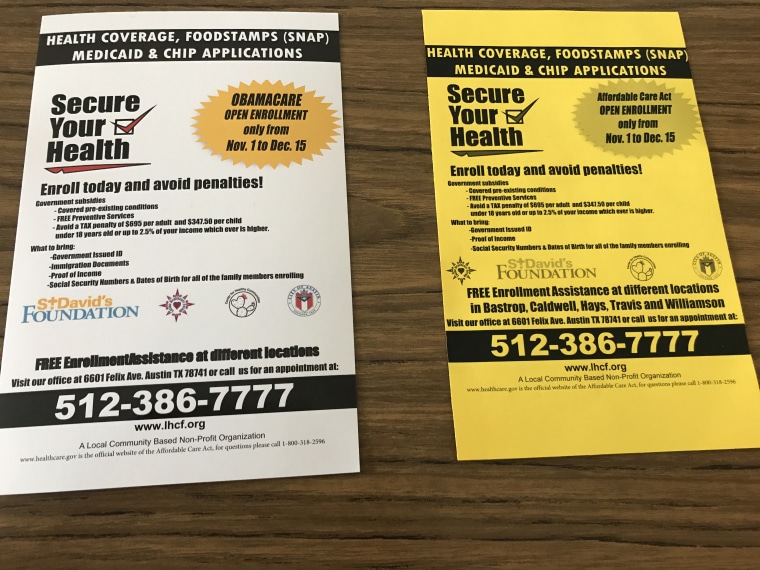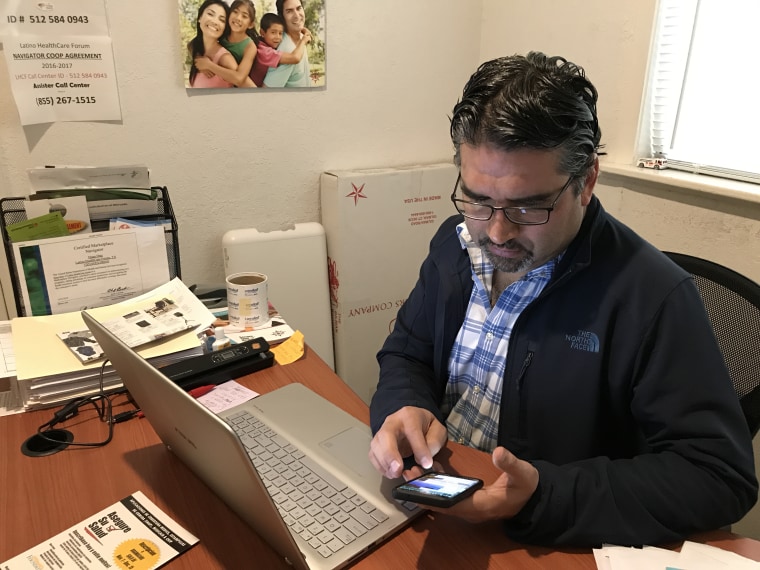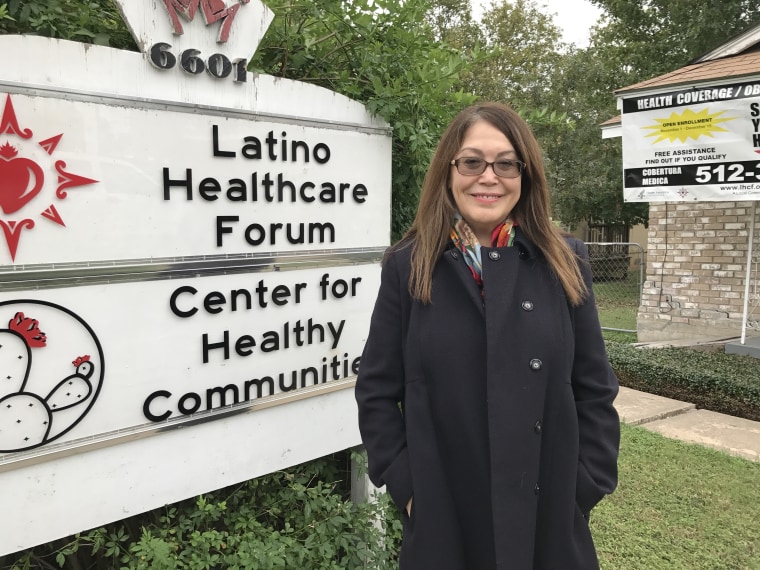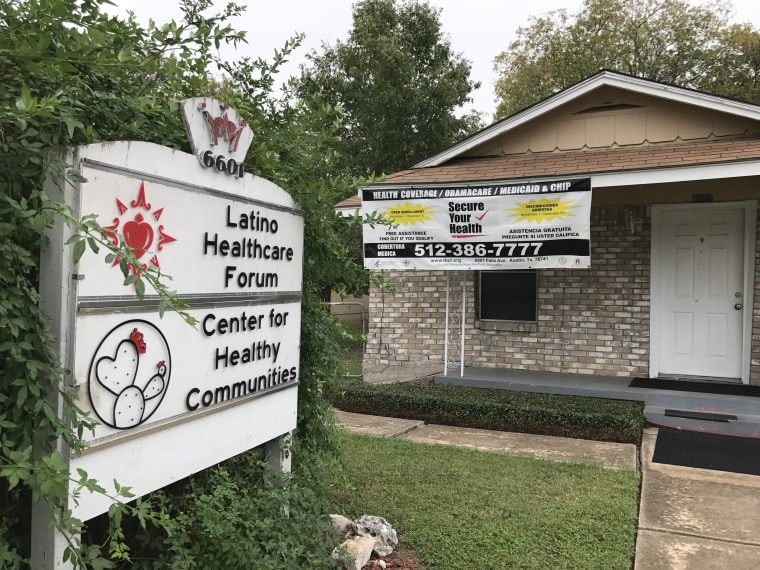AUSTIN, Texas – The Latino HealthCare Forum has been handing out two seemingly similar fliers to alert area Hispanics to sign up for Obamacare. But there are some differences. The ones they are distributing in surrounding conservative communities don’t mention Obamacare or immigration.
References to President Barack Obama and immigration were dropped from the fliers for conservative communities on the recommendations of school officials and community groups that work in the counties, said Jill Ramirez, president and CEO of Latino HealthCare Forum.
“They said it’d be great for you to be here, but you have to make changes to your flier,” Ramirez told NBC News.
Since enrollment first began in 2013, Latino HealthCare Forum has been helping Latinos sign up for health care insurance in the Affordable Care Act marketplace. But in this first year of enrollment under a Trump administration, the forum finds itself tiptoeing through the sticky politics of health care as its staff tries to reach Latinos in liberal Austin and Latinos who have migrated into the Republican communities and counties surrounding Texas' capital.
“We are having to rebrand, you know, start from scratch in those areas,” said Isabel Lopez-Aguilar, Latino HealthCare Forum project coordinator and a community health care worker.

This is happening after the group's federal grant of $241,000 was cut to $13,500 by the Trump administration, which slashed spending on "navigator" groups that help people wade through choosing a health coverage plan.
As a result, six of the group's formerly full-time navigators are now working part-time and Ramirez has taken a 20 percent pay cut.
"We've had to be more targeted, but that's our expertise," Ramirez said. With the full grant, "we would have more navigators and more places (to enroll) ... But we are doing the best we can."
Fortunately for the group, the city of Ausin continued its funding, giving it $125,000. The San Antonio-based St. David’s Foundation also provided $100,000 for the forum to enroll Latinos outside of Austin.

Reaching Latinos living outside the city has become increasingly critical because as the cost of living in the city has risen, more and more Latinos have moved to rural communities on Austin's outskirts or to nearby, more rural counties.
But reaching them takes negotiating some strident opposition to Obamacare and being more persistent in finding sites where staff can do enrollments. Ramirez and Lopez-Aguilar said a church in neighboring Williamson County turned them down and that they were initially turned away by some schools, although that has since changed.
As of March 2016, about a third of adult Latinos in Texas ages 18-64, or an estimated 2 million, were uninsured, according to the Health Reform Monitoring Survey conducted quarterly by Rice University’s Baker Institute and the Episcopal Health Foundation.
About 920,000 of the 2 million are eligible for coverage, the report said. The authors encouraged outreach and enrollment focusing on the 920,000 who have yet to sign up for coverage.
Ramirez said Latino HealthCare group has done twice as many enrollments at its 12 sites in the Austin areas as they had by this time in previous years.
"We can't keep up we have so many people," she said.
Most of the signups are people renewing their insurance, Ramirez said, not those getting insurance for the first time.
“I think a lot of people understand after all these years that health insurance has been good for them and don’t want to lose that,” Ramirez said.

Nationwide, there is worry that the progress made in reducing rates of uninsured among Latinos may stall or reverse. Rep. Ruben Kihuen, D-Nev., has teamed up with organizations to help get word out in English and Spanish about enrollment by holding press conferences and using social media.
"As elected officials we've had to step up and come up with innovative ways to convey messages to constituents," Kihuen said. In Nevada, the share of uninsured Latinos fell from 34 percent in 2013 to 19 percent in 2015, according to UnidosUS, the national Latino advocacy group.
Mayra Alvarez, a former Obama appointee in the Department of Health and Human Services who helped oversee Latino outreach for the Affordable Care Act, said 25 percent of working Latinos are uninsured now, compared to 43 percent before the law was implemented.
"I don't think we can underscore enough how important outreach and education are to enrolling people in coverage, even more for people of color and Latinos," she said.
"Enrollment doesn't happen by accident, it takes a lot of work by people," she said.
The Centers for Medicare and Medicaid Services, which is overseeing enrollment, declined a request for an interview to discuss Latino enrollment.
From the beginning, signing up people to get health coverage has had its difficulties. When Obamacare launched in 2013, there was the non-functioning website that crashed regularly, often wiping out an enrollee's information and forcing consumers and navigators to start over.
Ramirez said her attempts to enroll Latinos at a local Catholic church in the first year were thwarted by a church official who called it the "abortion law.” Catholics have opposed provisions of the law that conflict with the church's teachings on abortion and birth control.
Ramirez also had to fight rumors in the Latino community that electronic bar codes would be injected into people so the government could track them. There also have been problems of health insurers leaving the marketplace, narrowing coverage and physician options.
This year, the funding cuts follow multiple attempts by Congress to repeal the Affordable Care Act and President Donald Trump’s efforts to scuttle the law, leaving a lot of uncertainty. In addition, premiums and deductibles have increased, although the mostly low-income people that Latino HealthCare Forum largely serves are likely to see increases in federal subsidies to help them pay for insurance.
Related: 'Skinny' health plans confuse consumers
The administration also shortened the enrollment period, which began Nov. 1 and ends Dec. 15, so there still is question whether increased enrollment being seen around the country is a result of the shorter enrollment period or will mean a substantial increase in enrollees. (Texas does not run its own insurance exchange as do some other states, which will have longer enrollment periods.)
There is reason for the uncertainty. While enrollment is going full blast, the Senate is considering a tax reform bill that would eliminate the federal mandate for individuals to have health insurance coverage. Should that happen, some 13 million are expected to be without health insurance because money given them to help pay for the coverage would be used to pay for the tax cuts.
“There’s a lot of confusion out in the world right now, because different people get different messages and the administration is sending a message that perhaps the law doesn’t exist any more,” Ramirez said.
But even with the law in place, there are some uninsured Latinos Ramirez's group may never be able to help.
Texas chose not to expand eligibility for Medicaid as allowed under the Affordable Care Act so there are people in the state for whom Obamacare or Medicaid are not options. “And many of them are Latinos,” said Ramírez.

